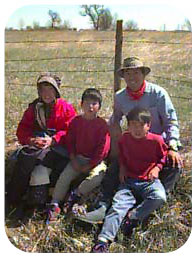Heritage Gateways
Official Sesquicentennial K-12 Education Projectsponsored by the Utah State Board of Education, the BYU-Public School Partnership and the Utah Education Network
Osamu Sekiguchi Journals
April 28, 1997

Location: Monroe, Nebraska - Location: 41:28:27N 97:35:57W
Summary: April 28, 1997 (Clear -> Strong wind from afternoon)
Journal entry: [Translated by Tomoko Nakayama]
Sweet cinammon roll, and apple and fruit punch. I wonder how many days a Japanese can stand this kind of breakfast. The trail is hard, but this is hard, too.
"The sun is getting stronger," I think to myself. "Boy is it strong - too strong." I had wished for the sky to clear, but not like this. We humans may be unpredictable, but the weather is much more unpredictable.
Our entire bodies soon become dusty. My wife Takako's eyes are bloodspotted because of the dust.
We pitch our tents at a town called Monroe that looks more like a field than a town. There is a small field and a large corn field that is already cultivated. This scenary is magnificient, but at the same time, it is the cause of so much dust. My whole family has dusty, sunburnt faces. I can't distinguish if my children are sunburnt or if it is dirt on their faces. Even more so, my children keep playing with their running noses, so under their noses looks even more dirty, and strangly sunburnt.
In the 150 year old records of Mormon pioneers are also accounts like, "My lips are sunburnt and sore," and "my face is peeling." They were probably dirtier than Yuji and Koji. How hard life was for the pioneers... I can't help but think, "Yuji and Koji, don't worry about your runny noses."
Unfortunately, the pole of the tent broke because of the strong wind. It was the first time I had seen a tent so twisted, like a squeezed mop. It looked like it would explode at any moment. The wind in Nebraska has no mercy.
We decided to dance after supper, (I was amazed that they could dance under these conditions, but I figured, this is probably another example of American's power) but I excused myself because I had a pain in my knee. They danced dances like the square dance to remember the pioneers. The old records tell that pioneers also gathered together, danced, and sang songs. It is also important to dance, to understand the pioneers' feeling. I decided to join in next time.